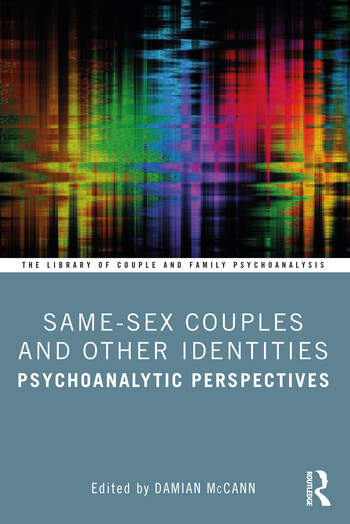Same-Sex Couples and Other Identities: Psychoanalytic Perspectives

Book Details
- Publisher : Routledge
- Published : 2021
- Cover : Paperback
- Pages : 230
- Category :
Family, Couple and Systemic Therapy - Catalogue No : 96211
- ISBN 13 : 9780367364465
- ISBN 10 : 9780367364
Reviews and Endorsements
This excellent book covers in extensive detail the many vicissitudes of modern psychoanalytic work with same-sex couples. It is comprehensive and ground-breaking in its range of topics, and much needed to break the silence and ignorance that too often prevail in this area. All the experienced contributors maintain the necessary tension between understanding the internal and the external sources of conflict in same-sex relationships. It will be an invaluable resource for years to come, to all couple therapists whatever their identities.
Joanna Ryan, The Site for Contemporary Psychoanalysis; co-author of Wild Desires and Mistaken Identities: Lesbianism and Psychoanalysis
If a successful outcome of psychoanalysis or psychotherapy is an ability to relate to the otherness of the other, then in the tradition of Ralph Roughton who encouraged us to engage in Rethinking Homosexuality, Damian McCann has produced an edited volume of challenging papers by accomplished clinicians to foster such rethinking about sexual otherness in couples. The book thus appeals to psychoanalysts to adopt new ways of thinking about sexuality when treating couples, which is based in contemporary research-based understandings and not in otherwise-biased thinking and clinical practices that have historically done much harm, both to patients and candidates.
Dr Timothy Keogh, President, Australian Psychoanalytical Society
In 2021 seventy-two jurisdictions across the world still criminalise homosexuality; in eleven of these the death penalty can be imposed. This outstanding edition reminds us that we cannot afford to be complacent and that it is essential that psychoanalysis engages with these external realities as well as applying its well-honed approach to investigating the internal world of the patient. The contributors challenge us to be mindful of the heteronormative biases and prejudices that continue to affect psychoanalytic thinking and practice even when we like to think that we are open and liberal. They powerfully illustrate through their work with couples that psychoanalysis has much to offer to our understanding of sexuality and gender as long as it can stand up to the self-questioning and scrutiny that contribute to the evolution of any discipline. This book is highly recommended. It is also essential reading.
Prof. Alessandra Lemma, Psychoanalysis University College London and Anna Freud National Centre For Children and Families

